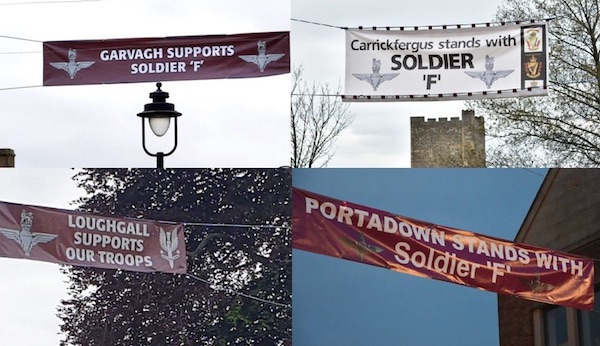
The proliferation of loyalist banners supporting killer British Army soldiers has been denounced as a hate crime.
A banner in support for ‘Soldier F’, who is currently facing Bloody Sunday murder charges, has been erected on Main Street, Garvagh. It is the latest to appear for the benefit of the British Army’s murderous Parachute Regiment, which was behind two of the worst massacres in the North of Ireland.
The PNSI police have shown no interest in the banners, the latest of which was erected across the main street of Garvagh in the County Derry town overnight on Monday, joining Carrickfergus and Portadown. A number of Parachute Regiment flags have also been erected in Garvagh and in locations across the North.
SDLP assembly member, John Dallat has said he believes the erection of the Garvagh banner was in breach of hate legislation.
“The banner is not a true reflection of the people of Garvagh,” he said. “This banner is an incitement to hatred. It is everything that the people of Garvagh do not want as an image of their village.”
The banner has also been condemned by Sinn Féin councillor Sean Bateson, who said it was designed to hurt the victims of Bloody Sunday and to cause community division.
“The banner proclaiming support for a murder suspect is not appropriate,” he said. “The victims of Bloody Sunday deserve the truth just as much as any victim of the conflict. This banner should be removed immediately.”
A similar banner has been erected in Loughgall, County Armagh, where eight IRA Volunteers were killed in 1987 in an ambush by the British Army’s SAS. Last week marked the 32nd anniversary of the attack.
The banner, which reads “Loughgall supports our troops”, carries the logos of the SAS and Parachute Regiment.
A sister of one of the victims has called on the British government to distance themselves from a banner she claims mocks his death. Mairead Kelly’s brother Paddy Kelly was one of nine men, including a civilians, who were killed on the day.
“I think if a different flag went up somewhere else there would be a loud outcry,” she said. “I think it’s insensitive particularly because the SAS killed nine people in that area. It shows a total disregard for the sensitivities of the families. I don’t think anybody should mock or take delight in the killing of anyone.”
Ms Kelly said “these symbols on this banner are MoD [Ministry of Defence] symbol The MoD has to distance themselves publicly or take responsibility and have the banner removed.”
Independent councillor Barry Monteith also said the banner is “very provocative” and caused distress to relatives of those killed.
“I would support the families in their call to have it removed,” he said.
TIME FOR TRUTH II
Meanwhile, a second ‘Time for Truth’ march in Belfast will highlight the continued intransigence of the British state on dealing with the legacy of the past next month.
A march in February last year saw more than 7,000 people take to the streets. Victims of the conflict behind the campaign have called for the 2014 Stormont House Agreement legacy mechanisms to be implemented and adequately resourced.
They have also called for resources for the Lord Chief Justice’s five-year plan to clear a backlog of legacy inquests and for the Police Ombudsman’s office to allow it to complete outstanding historical investigations.
This year’s Time for Truth march will take place on Sunday June 9.
Spokesman Ciarán Mac Airt said: “Yet again, the continued intransigence of the British state and its failure to deal with the legacy of the past has forced our families to take to the streets to seek our basic human rights.
“Some of our families have been fighting for nearly half a century for a proper investigation or inquest into the death of loved ones.”
![[Irish Republican News]](https://republican-news.org/graphics/title_gifs/rn.gif)
![[Irish Republican News]](https://republican-news.org/graphics/title_gifs/harp.gif)

